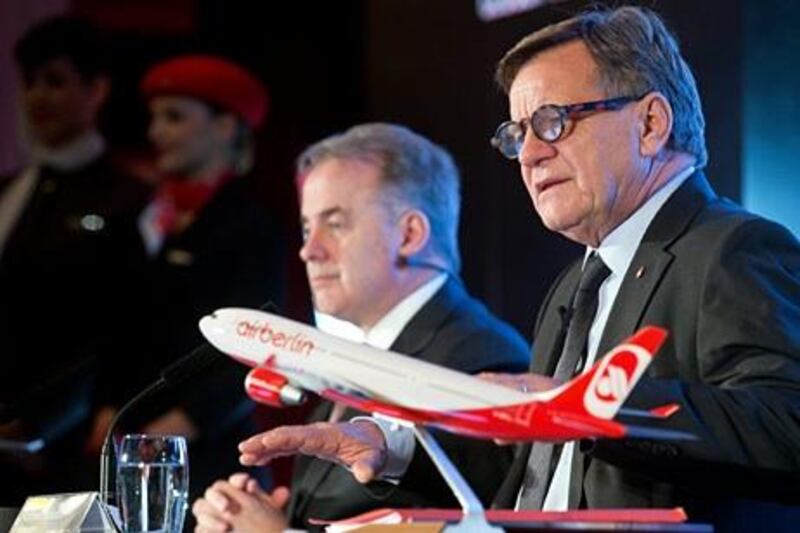Etihad Airways has signed a deal to buy a 70 per cent stake in Air Berlin's frequent flyer programme as part of a plan to set up the biggest air-miles scheme in the world.
Etihad said the transaction would have a total value of €200 million (Dh970.95) and that it would create a new holding company, the first step in a push into the global loyalty-programme sector.
Debt-laden Air Berlin split off its "topbonus programme" for frequent flyers only last month.
At a press conference in Berlin, James Hogan, Etihad's chief executive officer and president, said the airline planned to bring the 3.1 million topbonus members into its Etihad Guest programme, which has 1.8 million members. Etihad said the new entity would be spun off into what it described as a "a global loyalty management platform".
Mr Hogan said the deal consisted of an equity injection of €50m and debt financing of €150m, provided by HSBC and Commerzbank.
The company did not say how much revenue the new venture was expected to generate.
But Mr Hogan said the new "House of Brands" programme would act as a loyalty programme for both airlines and other sectors at more than 30 million outlets worldwide. Etihad Guest has 173 partners and topbonus has 123.
"The loyalty programme sector is a faster growing and higher margin business than the airline industry," he said.
"This new approach allows both our companies to reap greater rewards together, with opportunities to generate sustained profits from our loyalty programmes."
"The acquisition of a stake in the new topbonus company is part of our strategic evolution to create a 'House of Brands' loyalty management company, with global scale. The new company also provides an attractive vehicle for other airlines looking to generate further revenues from the fast-growing loyalty management sector."
Air Berlin, which has not made an operating profit since 2007, last month announced its decision to separate topbonus from its core operation and place it into a new entity, seeking external investment to develop the business further.
The move comes almost exactly a year after Etihad increased its stake in Europe's sixth-largest airline from 2 per cent to 29.2 per cent and granted Air Berlin Dh937m (US$255m) in loans as part of an ambitious overseas expansion policy that includes minority stakes in Virgin Australia, Aer Lingus and Air Seychelles.
"It is also a deal which offers Air Berlin an exciting future strategy for our frequent flyer programme while improving liquidity, our balance sheet and our equity position," said Hartmut Mehdorn, Air Berlin's chief executive.
Etihad and Air Berlin have been running reciprocal offers for members of both carriers' frequent flyer programmes for the past year.
The airlines said that since last year, Air Berlin and Etihad had carried more than 300,000 passengers onto each other's networks.
Etihad yesterday said that the alliance had already generated more than €100m in revenues in its first year.
The partners said they expected to make further savings next year through implementing cost-saving measures such as training Air Berlin pilots at the Etihad training centre in Abu Dhabi.
"Through revenues generated, and cost-saving initiatives, Etihad Airways has already recouped its initial investment," Mr Hogan said.
In March, Etihad and Air Berlin announced that the two airlines would integrate their Boeing 787 Dreamliner programmes, which involved the two carriers sharing infrastructure, pooling maintenance and developing joint training programmes on 56 aircraft.





